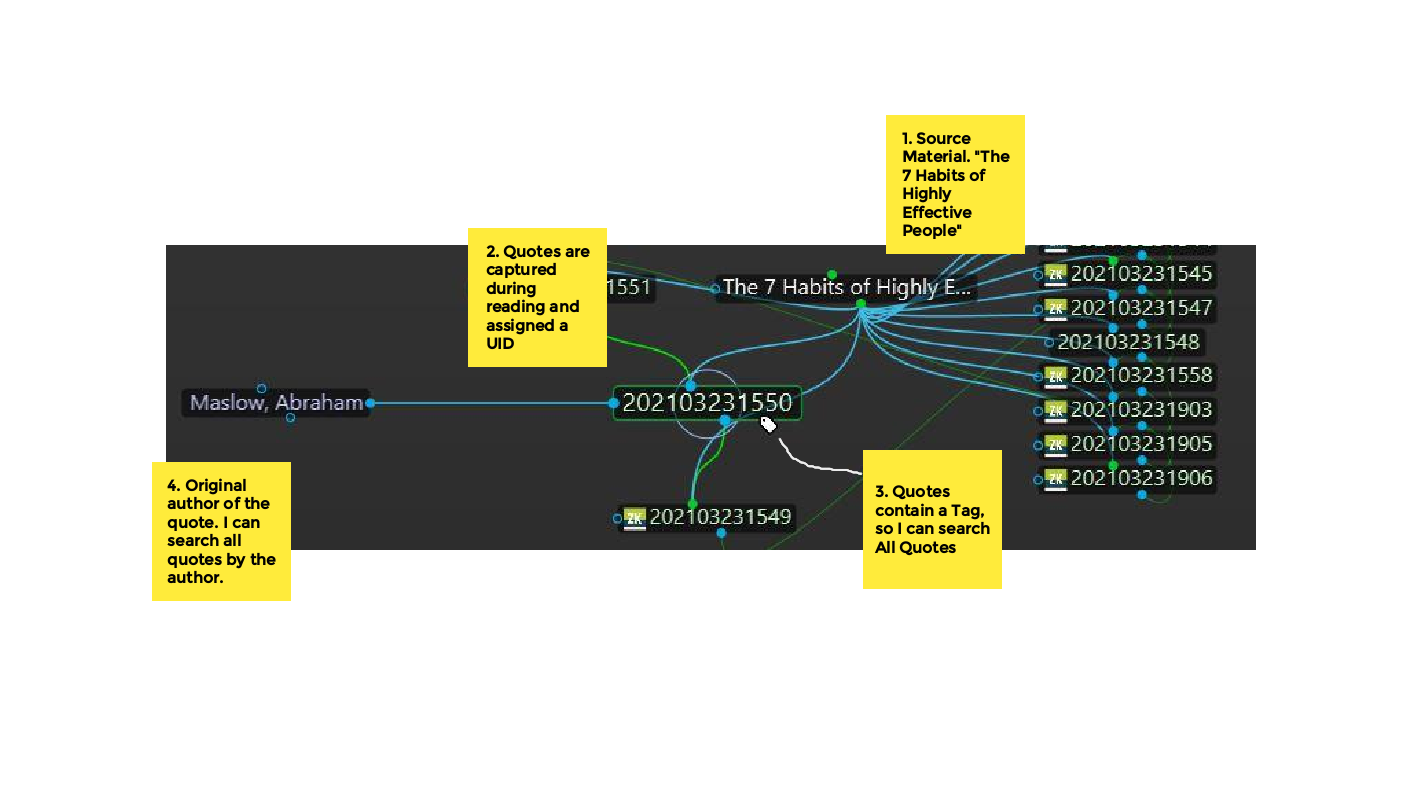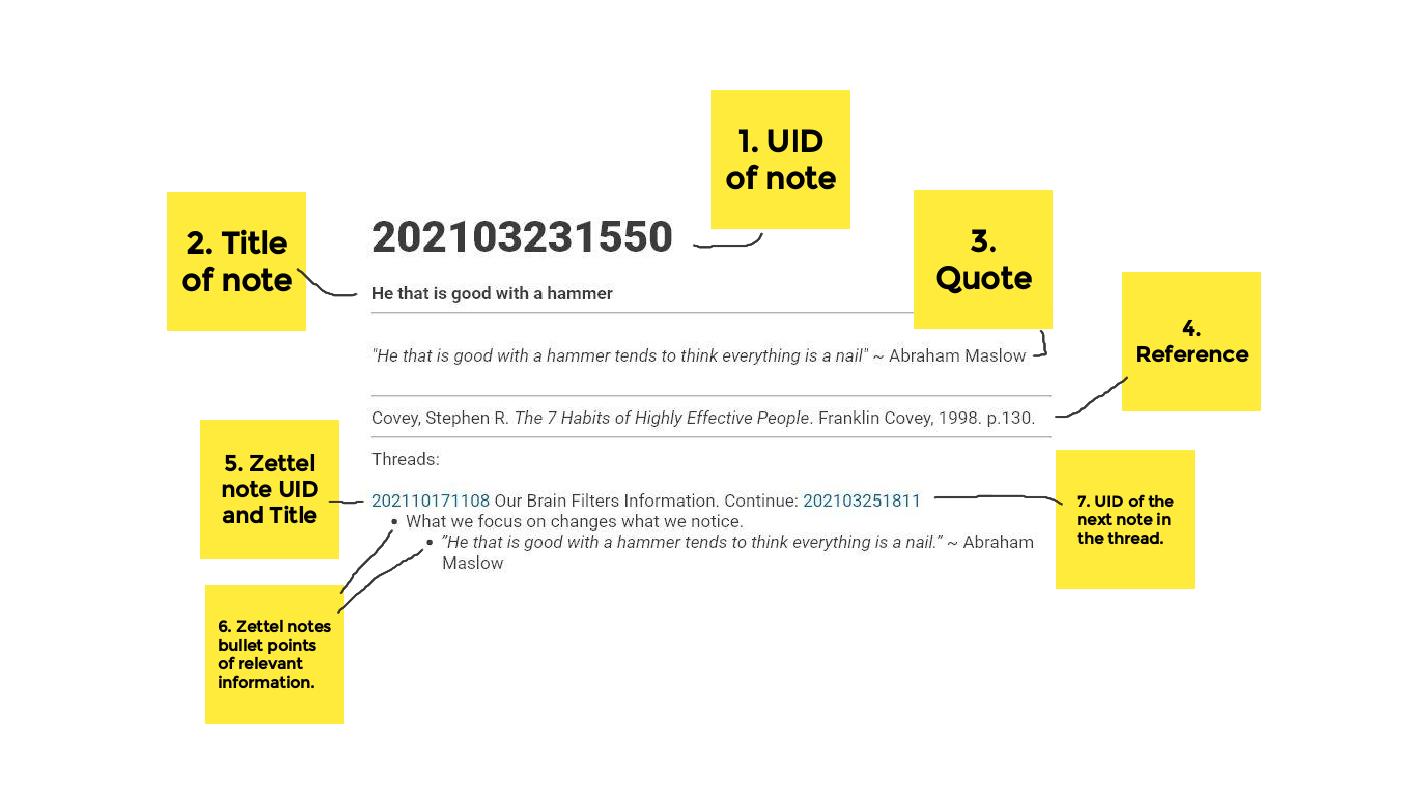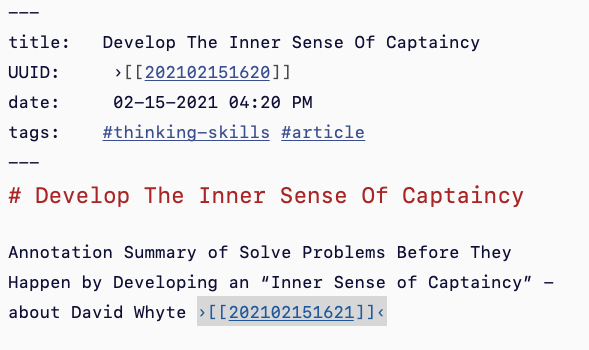How to handle (famous) quotes in your system?
Hi,
how do you handle famous quotes?
Do you rewrite them in you own words or do keep the original words?
How do you organise them?
- Are they part of the content of a zettel/idea?
- Or do you create a separate zettel for each quote?
- Or do you collect quotes by author (or topic) on a (big) zettel?
What is your way?
Howdy, Stranger!
Comments
I want the quote, so I capture it and comment on it or rephrase, give it a spin, and/or explain what I love about it -- @Sascha has an article in the making that'll show what this might look like when you process a quote very thoroughly.
Like all the other notes, ideally. First, by grouping them using tags. Then add links to them. "Use" the quote as an aphorism in a relevant context.
I don't do this a lot, though, so this might not always be possible. I have yet to figure out if making quote collections pays off, and how to structure them. -- I can imagine collections like "Quotes on the simple life", but if that's useful, I wouldn't know
This is my default -- unless I set out to collect a variety of quotes by different authors on the same subject, I would stick with that. Starting from a collection of N quotes on the same topic, I might then wonder if extracting some or all of them into individual notes would be even better. Depends on what I would use them for, really.
Which brings me to my question to you, @myn_user: what do you want to use them for?
Author at Zettelkasten.de • https://christiantietze.de/
It depends entirely on the nature of the quote what you can do with it.
I am a Zettler
That's a very good question. I see two different uses:
Then it would be good to integrate it in the zettel of the thought, I think.
Then the zettel of the quote ist the start for new thoughts.
@ctietze:
If you have a zettel of a quote and you use it in another zettel, do you "only" link it or do you use the whole quote again?
Example (inspired from sfast 😉):
@myn_user I have no general answer Your 2 points sound like a sensible start. Which is to say that this is not the one way to go, but rather both could work, depending on the circumstance.
Your 2 points sound like a sensible start. Which is to say that this is not the one way to go, but rather both could work, depending on the circumstance.
It's also totally possible to start with the quote "inlined" in a Zettel, then extract it later so you're able to reuse it.
Can only recommend @Will's article on malleability:
https://zettelkasten.de/posts/literature-notes-vs-permanent-notes/
In other words: start somewhere, experiment, try to improve to get better results next time right away. Eventually, conventions settle in.
As an example of extreme malleability, studying the Bible comes to mind, since it's such a huge topic. One could start with 1 quote in a note somewhere, not even anticipating extensive Bible studies. 20 years and a theology degree later, one might have created a comprehensive commentary on most of the New Testament. The first, OG quote could turn out to be part of that. It's unlikely, but not impossible or even impractical, that the first quote is still where it was originally. Things will change as needed all the time. -- That is, you change them to suit your needs, which in turn change the more material you have to deal with!
Author at Zettelkasten.de • https://christiantietze.de/
I capture (famous) quotes like any other material from a book or article; primary or secondary source.


I use a nonlinear format for Zettel note development, i.e., my Zettel note is not contained within a single Zettel but moves from reference note to reference note. If the quote is used in a Zettel thread, the idea is attached to the bottom of the quote.
My 'pay offs' are that I get a bunch of aphorisms that I can use for epitaphs when writing, I also place one random slogan in my daily journaling template as a bonus moment of reflection.
I hadn't consider this. My workflow has been such that I've collected a few hundred of these and to make the collection process trivial, I use Keyboard Maestro for lightening quick capture and they are all stored in a single zettel, one per line. At this stage, organizing them would not have a positive cost benefit. I just use a script that prints out a random "Super Slogan" or do a full text search. I link into this zettel but not out.
Here is an example.

In I have a link to a slogan.
Develop The Inner Sense Of Captaincy 202102151620.md
Here is how the resulting link looks like.

Super Slogans 202012281549.md
Will Simpson
My peak cognition is behind me. One day soon, I will read my last book, write my last note, eat my last meal, and kiss my sweetie for the last time.
My Internet Home — My Now Page
@myn_user My approach is pretty simple - if I like a quote enough to include it in my ZK, then it goes into a zettel verbatim, with the appropriate Markdown to show it is a quote, along with my own comments on why I like it and/or what I think it means. Then I connect that zettel to others, as one would if it did not contain a quote. I don't find it necessary to put the quote in it's own zettel - for me, that would just be busy work, but others who use different software or organize their ZK differently (e.g., @Steve625 ) would approach that in a different manner.
Thanks to all for your answers.
@GeoEng51: I believe that it is precisely the aspect of the enormous effort to manage a (real) quote individually that is my intellectual problem.
In the worst case, I have the quote (partially) in the title (if I use titles), completely in the body and possibly again (in some form) as a reference from another zettel.
I will adapt some ideas and adjust them to my needs.
As a former student of production techniques and thus also the lean management approach, I like @ctietze suggestion to apply @Will's approach of "continuous improvement".
Reminds me of the good ol' PDCA cycle.
The title for a zettel, in my opinion, should be sufficiently long/descriptive to remind you of content, but only that long. No need to overdo it. Obviously your choice of title and its length will have a lot to do with your familiarity with the subject; some in this forum might argue that it should be a bit longer, so that others (besides yourself) or your "future self" can understand it
Likewise, when I link from one zettel to another that has a quote, I don't need to talk about that quote. I just include the link (my practice is to put all links at the end of a zettel) and then a short description of what is in the linked zettel. This description is context sensitive to the content of the current zettel, to indicate why following that link might be of interest.
There is a certain amount of overhead involved with linking zettels, which is both necessary and unavoidable. However, one can streamline one's workflow to keep this overhead to a minimum.
P.S. I do use the tag "#Quotes" for any zettel containing a quote. Searching on that tag will allow me to review all quotes that I've included in my ZK; searching on that tag plus some other tag will allow me to find quotes on the subject of the second tag. For example, if I search on "#Quotes" and "#Knowledge" in my ZK, I find this delightful quote from Arthur C. Clarke:
For me, quotes are just a form of citation. So, when I cite, I do one of two things:
Recently I began to engage my Zettelkasten as a conversation partner. I had hoped to emulate the sociologist Niklas Luhmann, who wrote of such interactions. An excerpt from one such conversation follows, in which a verbatim quote was necessary.
The ratio of our intellects
ZK is not threatening to sue me. However, ZK has expressed misgivings about our interaction.
Propaedeutic probation
After twenty months of CPAP therapy, the grey and white matter in my brain lost to severe sleep apnea had been restored barely enough to meet ZK’s minimum cognitive qualifications.
Thanks to my prior lifetime of non-restorative sleep, ZK decided that I would undergo a rigorous program of remediation under its direction, in the unforgiving manner of the Zen masters of antiquity.
Accordingly, ZK insists that I must set aside any thought of mining it for “insights.”
GitHub. Erdős #2. Problems worthy of attack / prove their worth by hitting back. -- Piet Hein. Alter ego: Erel Dogg (not the first). CC BY-SA 4.0.